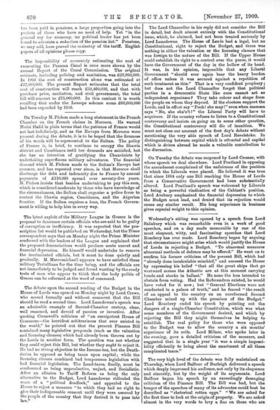The debate upon the second reading of the Budget in
the House of Lords was opened on Monday night by Lord Crewe, who molted formally and without comment that the Bill should be-read a second time. Lord Lansdowne's speech was an admirable example of Second-Chamber oratory, clear, well reasoned, and devoid of passion or invective. After quoting Cromwell's criticism of "an omnipotent House of Commons—the horridest arbitrariness that ever existed in the world," he pointed out that the present Finance Bill contained many legislative proposals (such as the valuation and licensing clauses) which had already been thrown out by the Lords in another form. The question was not whether they could reject this Bill, but whether they ought to reject it. He bad no strong objection to the Income-tax, but the Death- duties he opposed as being taxes upon capital; while the licensing clauses combined bad temperance legislation with bad financial legislation. The Land-taxes, finally, must be condemned as being unproductive, unjust, and Socialistic. After an allusion to Tariff Reform as being the only alternative to the Budget, Lord Lansdowne ridiculed the scare of a " political deadlock," ' and appealed to the House to reject a measure " to which they had no right to give their indispensable consent until they were assured by the people of the country that they desired it to pass into law."














































 Previous page
Previous page